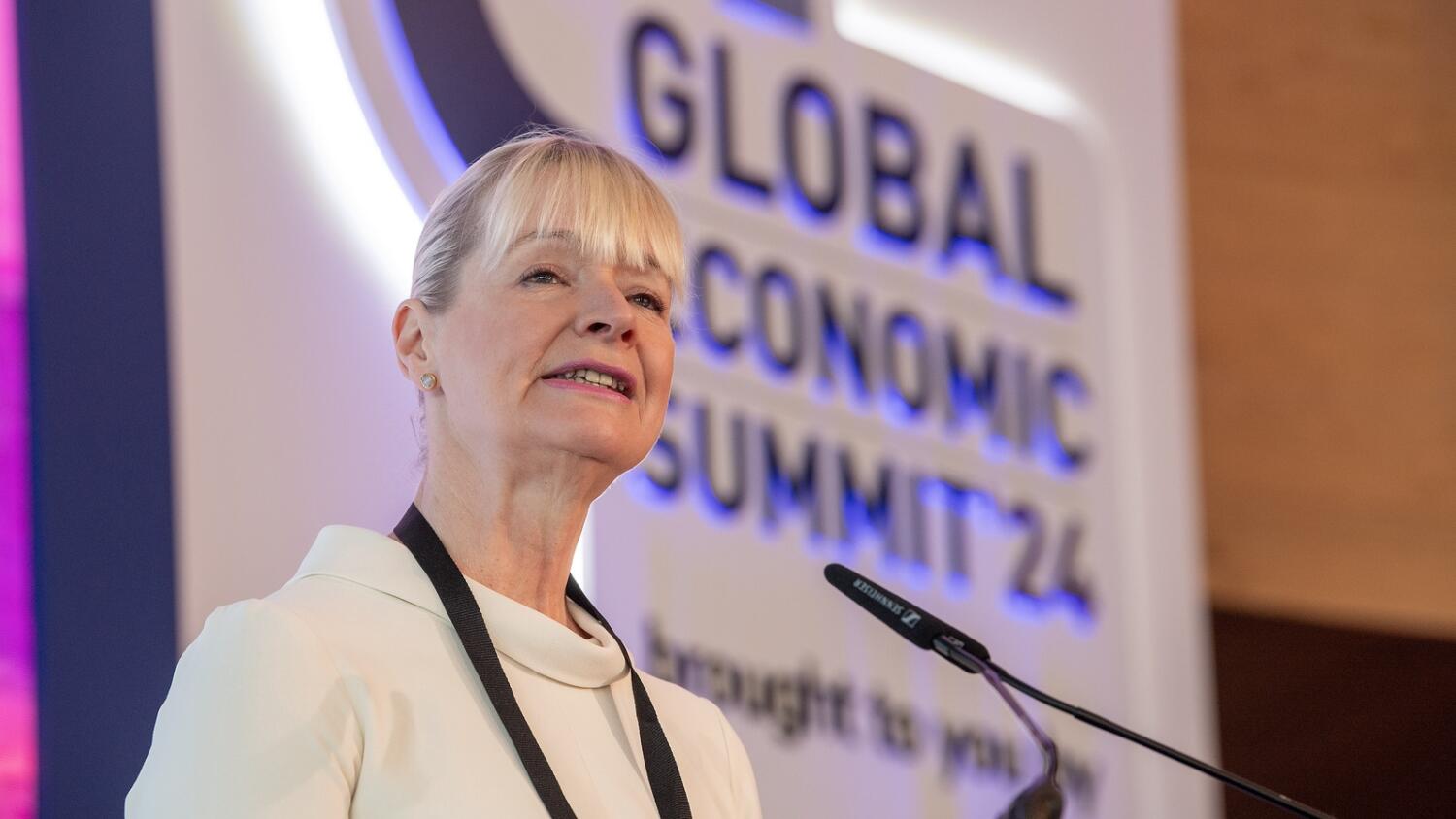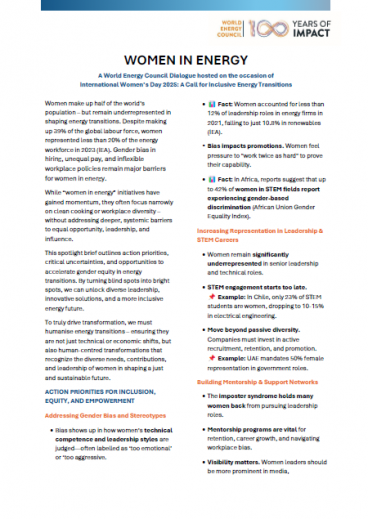Our Secretary General and CEO, Dr Angela Wilkinson, delivered a keynote on "Driving the energy transition – global partnership to reach shared targets" for the inaugural Global Economic Summit 2024 in Killarney, Ireland. Joined by global leaders including Prince Albert II of Monaco, New York Governor Kathy Hochul, and Director General of the World Health Organisation Dr Tedros Adhanom Ghebreyesus, this prestigious event was convened to develop fresh solutions to global challenges including climate change and economic inequality.
Below are Dr Wilkinson's remarks as prepared for delivery.

Your Serene Highness, Excellencies, Ladies and Gentlemen!
As the Secretary-General and CEO of the World Energy Council it is an honour to be invited to deliver this keynote for the inaugural Global Economic Summit here in Ireland. Thank you for the opportunity to share news on world energy developments and the outlook for global energy transitions and partnerships.
Let me start with a brief recap of the Council and then move to what we recently learned at our Centennial World Energy Congress last month. The World Energy Council formed as a visionary and practical leadership community in the early 1920s during a time of crisis to ensure modern energy developments contributed to peace. Ireland was among our founding communities, and I am sorry to say its membership lapsed during the COVID-19 crisis.
The Council’s global presence is still growing and now extends to all energy interests in more than 100 countries across all world regions. We are not an industry association, lobbying group, or think tank. We value independence, inclusivity, and impact.
We were the first to connect energy and women in the 1930s. Today we run Women in Energy and Kids in Energy Programmes in multiple world regions. We were the first to provide a practical tool to connect energy and sustainable development in the 1980s. We are pioneers of intergenerational leadership dialogue and action: our groundbreaking Future Energy Leaders Programme has grown across 60 countries over the last 40 years. And in the last decade, we have supported thousands of Energy Transition start-ups from nearly 70 countries and developing countries in particular to get the global recognition they deserve and need to bring their solutions to the global market to scale.
Our enduring mission to promote the benefits of sustainable energy use and supply has evolved through different eras of energy transition over the last 100 years. In this new era of energy for people and planet, we are committed to making faster, fairer, and more far reaching energy transitions happen to secure billions of better lives and a healthy planet.
This is the first opportunity to share what we learned during the 26th World Energy Congress in Rotterdam. We convened over 4000 visionary and practical energy leaders from 118 countries, representing the diversity of energy needs and interests in the broadest sense. We all focussed on how to get on with the urgent task of redesigning energy for people and planet.
First the unwelcome news.
World energy systems are no longer fit for purpose. Energy is still an existential issue for many parts of Africa. All signals point to an overshoot of 1.5oC. Extreme weather events are disrupting energy systems everywhere. New consumer-driven energy shocks and access and affordability crises are everywhere. The renewables revolution is at risk and not all energy uses can be electrified.
And if that’s not bad enough...
The term energy transition has become one of the most widely used, misunderstood and politically polarising phrase of the 21st century. Stories of heroes and villains are do little justice to the scale and scope of the world energy systems and the complexity of global energy transitions. Leaders spend most of the time discussing less than 10 % of the existing world energy systems. There is no quick or easy fix. There is no one size fits all technology pathway or policy prescription. And as Europe has recently learned, stopping supply without transforming demand is a recipe for disaster.
Anyone betting that the complex coordination challenges involved in decarbonising energy with resilience and justice can be solved by a moonshot of green hydrogen and/or generative AI is in for a surprise. The materiality of renewable power systems, cyber security threats and the rapid rise in digital energy demand have are parts of the puzzle.
A new world order is emerging, and the growing risk of supply chain disruptions and disorderly energy transitions is evident in the proliferation of trade barriers and disputes.
This presents a new threat to world peace.
The direction is clear. Net zero is an essential milestone, but it can’t be achieved all in one go or by anyone alone. And reaching the Paris Agreement is not enough to secure billions of better lives and a healthy planet.
So, what is the good news?
There is no such thing as all good vs bad energy. And there is no global shortage of capital or technology. The challenge is to increase global flows of technology and capital to where it will do the most good.
It’s a lack of energy literacy, trust, transparency that is the real binding constraint in making faster, fairer, and more far reaching energy transitions happen – and recognition is the first step to finding better solutions.
People are the biggest blind spot in all net zero roadmaps. Wider and wiser uses of energy are imaginable and achievable but the transformational power of demand is not being discussed.
A new systemic energy leadership mindset is emerging – a shift beyond supply-side security to user-centric resilience. Many and new ways of aligning diverse needs and interests are essential and emerging. Global energy alliances for net zero have proliferated at every COP but all action is local and place-based realities differ.
Today, China provides the global solar and wind supply chain to the rest of the world. The biggest solar and wind farms in the world are outside the OECD. The country that developed its biofuels supply chain decades ago is Brazil. In Sarawak, 99% of rural households have access to solar power and battery storage. Today, Indigenous communities can choose to delay or accelerate critical infrastructure developments.
Manging global energy transitions is not a single-issue agenda or about you vs. me. Instead, global energy transitions raise uncomfortable questions about who is the ‘we’ in convening power for common good. And all societies are learning the hard way that if they fail to measure performance and manage the evolving energy trilemma of security, affordability and sustainability with justice and resilience they risk swinging from one crisis to the next.
Public-private partnerships can inspire market competitions on digitalisation of energy systems and building a new global value chains in green hydrogen – and sow new seeds of conflict if they failing to engage the missing ‘p’ of people and diverse communities. The future of us all depends less on new energy technologies and more on new and radical approaches to collaborating with others. This is the new reality and fertile ground for a rejuvenation of world energy community, compact and impact.
For 100 years, we have convened power for the common good and connected the dots to chage the world.
Today we convene divers energy interests and needs in the broadest sense and support increasingly diverse regions in leading and learning together about how to make faster, fairer and more fare reaching energy transitions happen. This includes the transitions into energy by developing economies as well as the transition away from fossil fuels which is part of greening everything.
As we move towards the next World Energy Congress, which takes place in Saudi Arabia in October 2026, we are embarking on three bold moves:
- A new space for convening power
- Transforming the energy trilemma
- Activating energy literacy worldwide
We will convene our growing membership communities in the Global South as we shape a more inclusive, inspiring and impactful world energy leadership agenda on the Road to Riyadh.
We will transform what we measure.
We are looking for partners to help us radically redesign the World Energy Trilemma framework which is now used in over 120 countries to measure performance on energy security, affordability, and sustainability. We aim to extend the use of a new transformational trilemma tool to regions, cities, and citizens. This is an essential if societies are to manage deeper decarbonisation with justice and resilience to new kinds of energy shocks which are already building up in the system.
We are also aiming to launch an ‘activating’ energy literacy campaign to enable more people and diverse communities to better understand their roles and choices and hold their leaders to account.
The direction is clear, however, what got us to here will not get us to where we need to go.
There is an old joke about asking for directions in Ireland...the punchline .... you should be starting from a different place!
Unlike previous energy transitions which were driven by improvements in energy density and efficiency, this one cannot succeed without the pull of demand transformation and global collaborations. Success depends on convening a new systems of change makers – beyond CEOs and Ministers - energy users, owners, system operators, regulators, investors, and entrepreneurs, industries and communities. Global energy leadership involves walking the talk, active listening and shared sense making.
All living systems evolve through a fundamental shift in their underlying energy systems and without energy there is no civilisation. The hope for humanity is to urgently redesign energy for people and planet as part of a much deeper change in thinking from industrial societies to an ecological civilisation. We need to cultivate a new energy story and avoid defaulting to military and sporting terms which create fear of the future.
A better quality leadership conversation is needed and possible which connects power, justice, and love.
Humanising energy is about starting in a different place – not a moonshot technology mission, nor a mountain summit. Making faster, fairer, and more far-reaching energy transitions happen will succeed through 100s and 1000s of smaller steps and require attention to gaps in transparency, trustworthiness, and transformational actions.
Let me conclude with a line from an old Irish blessing.
May the road rise to meet you.
I believe it will because the World Energy Council is engaging more people and diverse communities, along with industries and governments, in transforming demand and supply to build the new energy roads to our common future.
Thank you!






_-80_result_688_387_s_c1_c_c.jpg)

